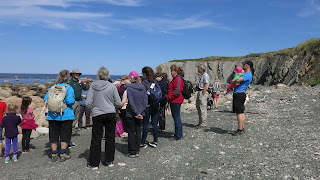Visiting
many US and Canadian parks and volunteering in one US National Park has given
us a great appreciation for how the parks convey what they are all about. Signs,
brochures, videos, and exhibits tell the story of each park. We also like to
listen to interpretive rangers and go on ranger-led tours when we get the
chance. Today we had the chance.
Lobster
Cove Head
Our
first stop was Lobster Cove Head to see the lighthouse and get a letterbox.
A
ranger was just opening up the building, so we got a chance to see the displays
and listen to her as she shared about the lighthouse’s history. She also shared
a brief tidbit on her background – the youngest of 9 children in a fisherman’s
family from the town just to the north. She said the lighthouse keeper was
wealthier because with his government income he could afford coal – while her
family used wood to heat their home.
Green
Point
Then
we headed to Green Point to catch a ranger-led tour. Well it happened to be
Canada Day. So Cedric, our ranger, started us off singing O Canada.
He
taught us about the geography of the park in a fun, engaging, and interactive way.
We
got a good look at the layers of sedimentary rock in the cliff and the story
behind them. Mud formed the flaky shale layers and shellfish formed the thicker
limestone layers. Tectonic plates colliding buckled the layers, turning them
vertical.
After
the tour, we found some red chairs on the top for a picnic lunch.
Broom
Point
We
followed that up by going to Broom Point with its preserved fisherman’s house
and exhibit. Three brothers and their families (ten people!) lived in the
little house during the summer in the mid 1900’s.
The
ranger gave helpful explanations on the life of fishermen and how they fished
for lobster, cod and salmon. Barbara learned that the lobster trap was
developed in Swampscott, Massachusetts – a town she lived in briefly.
We
also took a trail to a coastal viewpoint with a far off glimpse of the cliffs
at Western Brook Pond and more red chairs. :-)
Cow
Head
We
ended our day with a hike to the end of Cow Head. We passed a tiny lighthouse
that is no longer operational and now surrounded by woods.
Most
of the trail was in the woods, but we got water views at the point of the head.










